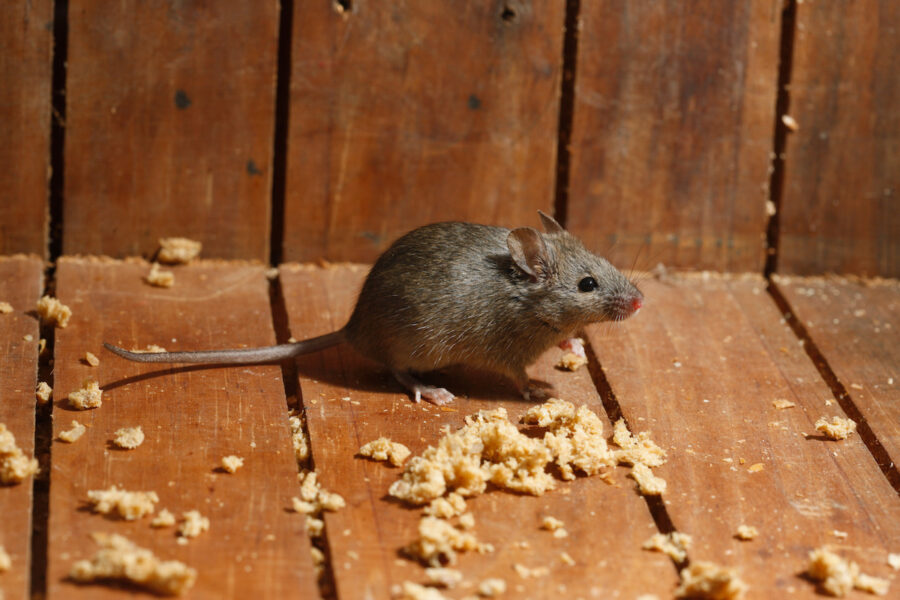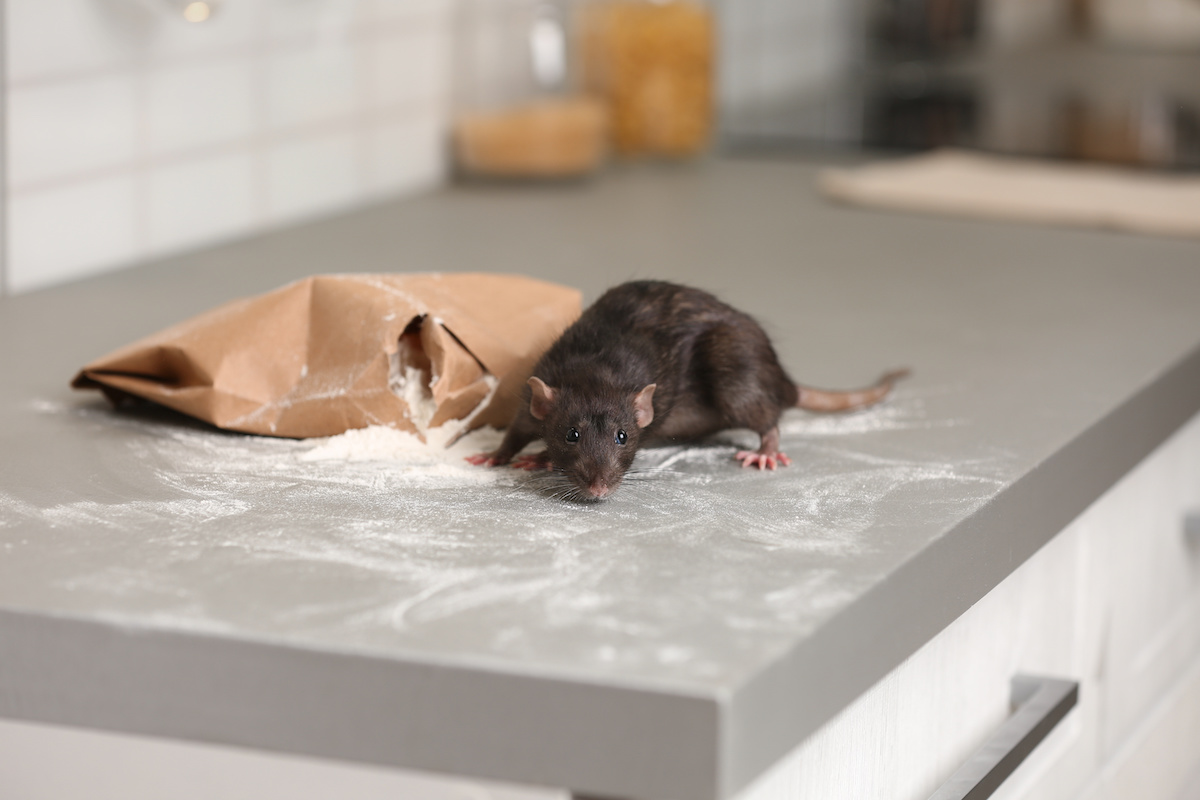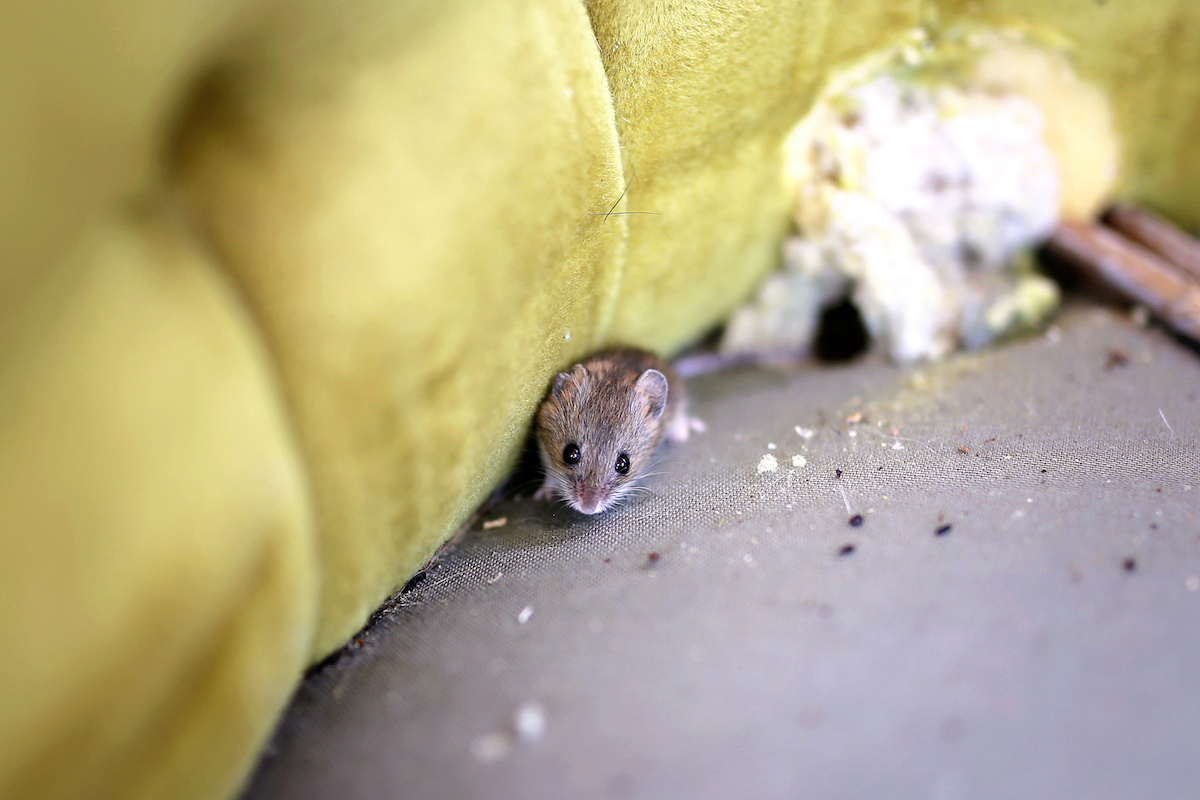
Discovering signs of rats and mice in your home can be unsettling, but it’s essential to address the issue promptly to prevent further infestation and damage. These elusive rodents can be adept at hiding, making it crucial to know how to recognize the telltale signs of their presence.
In this blog, we’ll explore some of the dangers of rats and mice living in your home. We’ll also cover the common signs of rats and mice infestations in homes and provide tips on what to do if you suspect you have unwanted rodent guests.
Let’s get started!
The Dangers of Rats and Mice in Your Home
Beyond the nuisance they cause, rats and mice can pose significant dangers to the health and safety of occupants. Here are some of the potential risks associated with having rats and mice in your home:
Disease Transmission
Rats and mice are known carriers of various pathogens, bacteria, and parasites that can be transmitted to humans through contact with their urine, feces, saliva, or fleas. Diseases such as salmonellosis, leptospirosis, hantavirus, and rat-bite fever can result from exposure to contaminated materials or bites from infected rodents.
Allergies and Asthma
Rodent allergens, including proteins found in their urine, saliva, and dander, can trigger allergic reactions and exacerbate asthma symptoms in sensitive individuals. Prolonged exposure to rodent allergens can lead to respiratory issues, including coughing, wheezing, chest tightness, and difficulty breathing.
Food Contamination
Rats and mice are notorious for raiding food storage areas and contaminating food with their urine, feces, and saliva. Consuming food that has been contaminated by rodents can lead to food poisoning and gastrointestinal illnesses. Additionally, the presence of rodents in food preparation areas can result in violations of health and safety regulations for businesses.
Property Damage
Rats and mice have a habit of gnawing on objects to wear down their constantly growing teeth. Their gnawing behavior can cause extensive damage to property, including wooden furniture, electrical wiring, insulation, and food packaging. Chewed wires can create fire hazards, while structural damage caused by gnawing can compromise the integrity of buildings.
Fire Hazards
Rodents are known to chew on electrical wiring, creating a significant fire hazard in homes and businesses. Chewed wires can expose the underlying conductive material and create a risk of electrical shorts, sparks, and fires. Electrical fires caused by rodent damage can result in property damage, injuries, and even fatalities.
Unpleasant Odors
The presence of rats and mice can result in unpleasant odors due to the accumulation of urine, feces, and decaying rodents. These odors can permeate living and working spaces, creating a discomforting and unsanitary environment for occupants.

Common Signs of Rats and Mice
Below are the most common signs rats and mice are living in your home.
1. Droppings
One of the most evident signs of a rat or mouse infestation is the presence of droppings. Rat droppings are typically larger than mouse droppings, with a tapered shape and dark color. Mouse droppings are smaller, resembling grains of rice, and may be scattered throughout the home:
- Near food sources
- Along baseboards
- In hidden corners
Regularly inspecting your home for rodent droppings can help you identify the extent of the infestation and take appropriate action.
2. Gnaw Marks
Rats and mice have a constant need to gnaw on objects to keep their teeth from growing too long. As a result, you may notice gnaw marks on various surfaces in your home, including:
- Walls
- Baseboards
- Furniture
- Electrical wiring
Fresh gnaw marks will appear light in color, while older marks may be darker or more weathered. Identifying gnaw marks can help you determine where rodents are active and take steps to prevent further damage to your property.
3. Nesting Materials
Rats and mice use a variety of materials to build nests, including shredded paper, fabric, insulation, and dried plant matter. Look for nests in secluded areas of your home, such as:
- Attics
- Crawl spaces
- Wall voids
- Storage areas
Nests are often constructed in dark, protected spaces near sources of food and water, making them challenging to spot. If you find evidence of nesting materials, it’s essential to take action to remove the nests and address the underlying infestation.
4. Grease Marks
Rodents have oily fur that leaves behind greasy marks or smudges as they navigate through your home. These marks may appear along walls, baseboards, and other surfaces where rodents travel frequently. Grease marks are often most noticeable in areas with high rodent activity, such as near food sources or along known pathways.
Paying attention to these marks can help you track the movements of rats and mice and identify potential entry points into your home.
5. Strange Noises
Rats and mice are nocturnal creatures and are often most active at night. If you hear scratching, scurrying, or squeaking noises coming from walls, ceilings, or floors, it may be a sign of rodent activity. These sounds can be especially noticeable in quiet areas of the home during the evening hours.
Paying attention to unusual noises can help you detect rodent infestations early and take steps to address them before they escalate.
6. Unexplained Damage
Rodents can cause damage to property in various ways, including chewing on wires, gnawing on wooden structures, and contaminating food supplies. If you notice unexplained damage to belongings or property, such as chewed wires, torn fabric, or holes in walls or flooring, it may be a sign of a rodent infestation.
Investigating the source of the damage can help you identify the presence of rats or mice and take appropriate measures to address the problem.
7. Unpleasant Odors
Rodent infestations can produce unpleasant odors due to the accumulation of urine, feces, and decaying rodents. These odors may be most noticeable in enclosed or hidden areas of the home, such as:
- Attics
- Crawl spaces
- Wall voids
If you detect musty or ammonia-like odors that persist despite cleaning efforts, it may indicate the presence of a rodent infestation. Addressing the source of the odor is essential for eliminating the infestation and restoring a healthy indoor environment.

What to Do If You Spot Signs of Rats and Mice in Your Home
If you suspect you have rats or mice in your home, it’s essential to take action promptly to prevent further infestation and damage. Here are some steps you can take to address a rodent infestation effectively:
1. Inspect Your Home
Conduct a thorough inspection of your home to look for signs of rodent activity, including droppings, gnaw marks, nesting materials, grease marks, strange noises, unexplained damage, and unpleasant odors. Pay particular attention to areas where rodents are likely to hide or travel, such as:
- Kitchens
- Pantries
- Basements
- Attics
- Crawl spaces
2. Seal Entry Points
Identify and seal any gaps, cracks, or openings in your home that could serve as entry points for rodents. Use steel wool, caulk, wire mesh, or other appropriate materials to close off potential access points around:
- Doors
- Windows
- Vents
- Pipes
- Utility lines
Preventing rodents from entering your home is essential for long-term control and prevention of infestations.
3. Remove Food Sources
Eliminate sources of food, water, and shelter that may attract rodents to your home. Store food in airtight containers, clean up spills and crumbs promptly, and dispose of garbage in sealed containers with tight-fitting lids. Trim vegetation away from the exterior of your home to reduce hiding places for rodents and minimize access to your property.
4. Set Traps
Use traps to capture and remove rats and mice from your home. Choose traps based on the size and species of rodents present, and place them in areas where you’ve observed signs of rodent activity. Check traps regularly and dispose of captured rodents in a sealed plastic bag placed in an outdoor garbage bin.
5. Consider Professional Pest Control From James River Pest Solutions
If your efforts to control a rodent infestation on your own are unsuccessful, or if the infestation is severe, consider hiring a professional pest control company, like James River Pest Solutions, to assist you. Licensed pest control technicians have the knowledge, experience, and resources to effectively eliminate rodent infestations and implement long-term prevention strategies.
Get the Rats and Mice Out of Your Home
Recognizing the signs of rats and mice in your home is the first step toward effectively addressing a rodent infestation. By knowing what to look for and taking prompt action to address the problem, you can prevent further damage to your property and ensure a safe, healthy living environment for you and your family.
If you suspect you have rats or mice in your home, don’t hesitate to contact James River Pest Solutions for expert assistance in identifying and eliminating rodent infestations. With our professional expertise and proven solutions, we can help you regain control of your home and enjoy peace of mind knowing that your property is rodent-free.